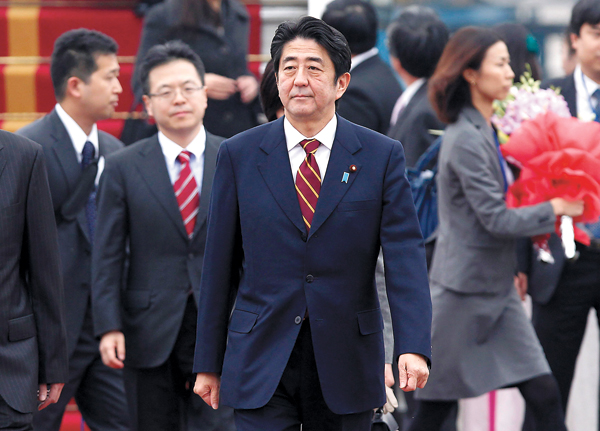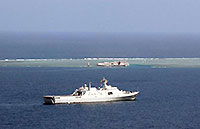Ex-Japan PM apologizes for wartime crimes in China
By Zhang Yunbi in Beijing, Cai Hong in Tokyo and Cang Wei in Nanjing (China Daily) Updated: 2013-01-18 02:38"The resolute response of Suga, Tokyo's top spokesman, to Hatoyama's remarks have shown that even the voice of the former prime minister cannot reshape Tokyo's hard-line position," said Lu Yaodong, director of the department of Japanese diplomacy at the Chinese Academy of Social Sciences.
In another development, Natsuo Yamaguchi, the New Komeito Party leader, said Thursday that he will pay a four-day visit to China from Tuesday.
Yamaguchi said his party had a responsibility to try to restore Japan-China relations, Japan's leading news agency Kyodo News said.
The pacifistic New Komeito Party is part of Japan's coalition government.
Yamaguchi said he would consult with Abe on whether he would carry a letter or deliver a message from the prime minister to China.
|
 Japan's Prime Minister Shinzo Abe (center) arrives at Noi Bai airport in Hanoi, Vietnam, on Wednesday. Abe is in Hanoi for a two-day visit to Vietnam, the first leg of his Asian tour. [Photo/Agencies]
|
Lu, from the academy, said it would be wrong to place too many hopes on Yamaguchi's trip to Beijing.
Zang, from Fudan University, said: "Abe has cornered himself and will lose a lot of right-wing support if he tries to get out of the corner."
Abe arrived in Thailand on Thursday, the second leg of a three-nation tour.
When interviewed by Thai media before his arrival, Abe reiterated Tokyo's unchanged position on the islands but he also vowed to boost communication with Beijing.
Abe may be trying to build regional support but few countries want to be involved, said Liang Yunxiang, a professor of Japanese studies at Peking University.
Contact the writers at zhangyunbi@chinadaily.com.cn
Special coverage:
China-Japan Dispute over Diaoyu Islands
- Abe makes 1st overseas visit to 3 Asian countries
- Abe's regional trip 'targets China'
- Japan's growth hurt by row with China - World Bank
- Japan's Komeito leader to visit China to mend ties
- Japan,US hold talks on revising defense guidelines
- Thailand, Japan pledge to cement economic ties
- Japan launches military drill on island defense
- Japan responsible for plight with China
- China responds to Japan's defense spending boost







